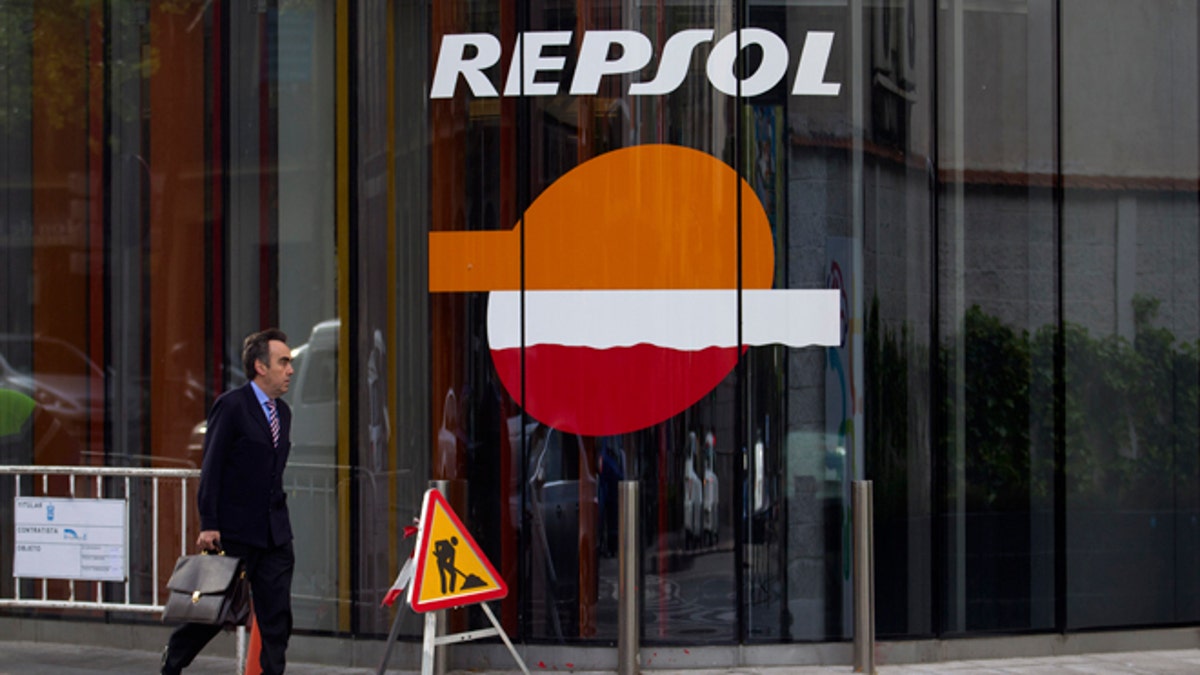
(A man walks past a Repsol gas station in Madrid, Wednesday April 18, 2012. (AP Photo/Paul White))
The Spanish energy firm Repsol, whose Argentine unit YPF was nationalized last week, has Spain and Argentina in a political tit-for-tat.
In the latest move by Repsol, the company is now considering legal action against companies or investors that help Argentina exploit oil sources the company had planned to tap after they discovered vast shale oil and gas deposits.
The oil was found under the "Vaca Muerta" or Dead Cow basin of Neuquen province.
The Repsol controversy is a result of simple economics. Less than a decade ago, Argentina was an exporter of oil and natural gas. Now the government has to spend billions of dollars to import fuel. This dramatic reversal of fortune is why Argentina, already a global financial rogue after its historic debt default, is willing to risk becoming even more of a pariah by seizing control of its leading oil company from Spanish hands, analysts say.
It is in Argentina's interest not to end up isolated in the world.
Experts say Argentina will need strategic partners to tap the world's third-largest unconventional reserves, and Argentine officials have wasted no time in lining up potential investors. They met last week with executives of French-owned Total Austral and Brazil's Petrobras, announcing afterward that both planned to expand production.
They planned to meet Monday with executives from Chevron and ExxonMobil, which have their own shale stakes in Argentina, and Apache, which began drilling through shale there last year.
Repsol YPF SA spokesman Kristian Rix says the company "is reserving the rights to take legal action against any investor in YPF or its assets following the unlawful expropriation of that company."
Repsol's share price sank nearly 6 percent to euro14.05 ($18.45) in late afternoon trading in Madrid on Monday, underperforming the benchmark Ibex index, which was down 3 percent. The shares were around euro18 before Argentina announced the move to take over formerly state-owned YPF.
The Spanish government, meanwhile, adopted a carrot and stick approach.
Foreign Minister Jose Manuel Garcia-Margallo sounded conciliatory, saying Spain historically had very good relations with Argentina and wants to recover them. He said Spain would try to convince Argentina it needed to reach agreement with Repsol on fair compensation for nationalizing YPF, which he nonetheless said was a mistake that would scare off foreign investors.
"It is in Argentina's interest not to end up isolated in the world," the minister said.
At the same time, he said, Spain has proposed to EU partners a series of retaliatory measures against Argentina, such as filing a complaint with the World Trade Organization or downgrading trade relations.
The EU could strip Argentina of trade benefits provided to developing countries or halt free-trade talks between the EU and the South American bloc called Mercosur. That would mean dealing bilaterally with Mercosur's non-Argentine members, which are Brazil, Uruguay and Paraguay, Garcia-Margallo said in Luxembourg.
While Argentine President Cristina Fernandez's move on YPF has infuriated Spain, the country's largest foreign investor, it has elated many Argentines.
Only two months earlier, Repsol had increased its estimate for the shale oil and gas it found in Argentina to nearly 23 billion barrels, enough to double the country's output in a decade.
But the Spanish company said it would cost $25 billion a year to develop, and warned that Argentina would need to overhaul its energy policy to attract the necessary investment.
Instead, Fernandez simply seized the company, giving her government access to billions of dollars' worth of cash, enough energy to answer domestic demand in the short term, and potentially even solving Argentina's chronic money woes in the future. The move has been overhwelmingly popular in Argentina, whose Senate will likely approve it on Wednesday.
Repsol has valued the shares Argentina seized at $10.5 billion, but it's unclear when -- if ever -- the company will get compensation. A report Monday in Argentina's La Nacion newspaper said Deputy Economy Minister Axel Kicillof, named by Fernandez to help run YPF, assured her that Repsol would not get "one penny."
She accused Repsol of draining YPF since gaining control in the 1990s, underinvesting in its oil and gas fields and failing to keep pace with the needs of Argentina's growing economy even as it paid huge dividends to shareholders.
Repsol blames Argentina's ever-changing mix of subsidies, price caps and export taxes for depressing production as the country's demand for energy soared since 2003, when her husband, President Nestor Kirchner, came to power.
Argentine oil production plunged 22 percent from 2000 to 2010, even as demand surged more than 40 percent, according to data from the Argentine Oil and Gas Institute and the Energy Ministry compiled by a former energy secretary, Emilio Apud.
Argentina's production has fallen so low that the government now spends billions of dollars a year on expensive imported fuels that it provides at a loss to companies and consumers.
Based on reporting by the Associated Press.
Follow us on twitter.com/foxnewslatino
Like us at facebook.com/foxnewslatino
